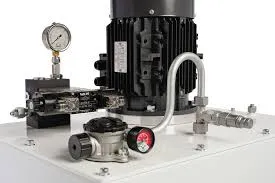Nov . 18, 2024 09:41 Back to list
hydraulic cylinder for press product
Hydraulic Cylinder for Press Product An Overview
Hydraulic cylinders are essential components in the field of hydraulic machinery, particularly in applications that require high pressing force and precise control. They are utilized in various industries, including manufacturing, construction, and automotive sectors, for tasks such as metal forming, plastic molding, and assembly operations.
A hydraulic cylinder converts hydraulic energy into mechanical energy through the use of pressurized liquid, which acts upon a piston within a cylindrical housing. This process allows for the generation of significant force in a compact design, making hydraulic cylinders highly efficient for pressing applications.
Construction and Function
A hydraulic cylinder typically consists of several key parts the cylinder body, piston, piston rod, seals, and end caps. The cylinder body houses the piston and contains hydraulic fluid—the medium that transmits force. The piston divides the cylinder into two chambers, each connected to a hydraulic line. When hydraulic fluid is pumped into one chamber, it exerts pressure against the piston, causing it to move and drive the piston rod, which then delivers the force to the pressing apparatus.
The effectiveness of a hydraulic cylinder lies in its ability to produce a large amount of force from a relatively small input. This is governed by Pascal's Law, which states that pressure exerted on a confined fluid is transmitted undiminished throughout the fluid. As a result, even a small hydraulic pump can generate substantial power when applied through a hydraulic cylinder.
Applications in Pressing
In pressing operations, hydraulic cylinders play a crucial role. They are used in various types of presses, including hydraulic presses, forging presses, and stamping machines. The pressing process often requires a significant amount of force to shape, cut, or permanently deform materials. For instance, in metalworking, hydraulic cylinders are used to apply pressure that molds metal sheets into desired shapes or sizes.
One of the advantages of hydraulic pressing is its ability to deliver consistent and controlled pressure, which can be adjusted according to the specifications of the material being worked on. Furthermore, hydraulic cylinders can be designed to provide a smooth and steady movement, reducing the risk of damage to delicate components during the pressing process.
Advantages of Hydraulic Cylinders
The use of hydraulic cylinders for press products offers numerous benefits
hydraulic cylinder for press product

2. Precision and Control The ability to finely control the pressure and speed of the cylinder movement ensures accuracy in pressing operations.
3. Compact Design Hydraulic systems can achieve high forces in a relatively small space, making them suitable for environments with limited room.
4. Versatility Hydraulic cylinders can be used in a wide array of applications, from light assembly tasks to heavy industrial pressing, making them highly versatile.
5. Reduced Wear and Tear Compared to mechanical systems, hydraulic cylinders typically experience less wear, leading to lower maintenance costs and longer operational life.
Challenges and Considerations
While hydraulic cylinders offer numerous advantages, certain challenges must be addressed. For example, hydraulic systems rely on the integrity of the hydraulic fluid and the seals. Any leaks or fluid contamination can lead to reduced efficiency and may pose safety hazards. Regular maintenance and monitoring are therefore crucial.
Additionally, hydraulic systems can be affected by temperature variations, which can change the viscosity of the hydraulic fluid and impact performance. Therefore, appropriate fluid selection and temperature management are essential for optimal functioning.
Conclusion
The hydraulic cylinder is a vital component in pressing applications, providing the necessary force and precision required in various industrial settings. Its design and functionality enable a wide range of applications, from metal forming to plastic molding. Despite some challenges associated with maintenance and fluid management, the advantages of hydraulic cylinders make them an indispensable tool in the modern industrial landscape. As technology advances, we can expect further innovations in hydraulic cylinder design and application, enhancing their efficiency and effectiveness across various sectors.
In conclusion, understanding the role and capabilities of hydraulic cylinders for press products is critical for industries looking to optimize their operational efficiency and product quality. With their high force output, versatile application, and ability for precise control, hydraulic cylinders remain a fundamental element of hydraulic machinery.
-
Fork Lift Power Units - Hebei Shenghan | Efficiency, Reliability
NewsJul.13,2025
-
1.5-Ton Turbocharged Cylinder-Hebei Shenghan|Hydraulic Solution,Energy Efficiency
NewsJul.13,2025
-
Auto Hoist Power Units-Hebei Shenghan|Efficiency&Industrial Lifting
NewsJul.13,2025
-
Double Acting Power Units-Hebei Shenghan|Hydraulic Solutions,Industrial Efficiency
NewsJul.13,2025
-
1.5 Ton Lifting Cylinder 70/82-40-290-535 - High-Performance Hydraulic Solution | Hebei Shenghan
NewsJul.13,2025
-
Fork Lift Power Units - Hebei Shenghan | Efficiency&Reliability
NewsJul.13,2025
